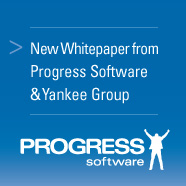By: Jesse Cryderman

Over the past month we've watched significant news unfold that will have a dramatic impact on the communications IT landscape. Major players announcing fundamental changes in business strategy and big news from Apple have the news outlets buzzing, and for good reason. We're witnessing the beginning of a new era, a post-jobs era, an era where hardware companies go soft, and everyone wants their piece of the software and services business.
An Apple a Day
Last month, it seems as if every day brought a new headline from Apple, culminating in the surprise announcement that Steve Jobs would be stepping down as CEO. At the beginning of the month, Apple's valuation surpassed Exxon Mobile, briefly making Apple the most valuable corporation in the world. Soon after, news of a possible deal with China Mobile (the largest wireless carrier in the world) hit the wire. Apple may soon design and rollout an iPhone for China Mobile's TDSCDMA network. Then it was leaked that Sprint will become the third carrier in the U.S. to carry the iPhone, as part of the iPhone 5 launch in October.
The biggest news, though, was certainly the announcement that Steve Jobs, the public face of Apple and the captain of the ship during the company's meteoric rise, would step down as CEO. However, while the world continued to buzz in the aftermath of the news (one person called the coverage “giddy”), Apple killed off it's .99-cent TV rental service and made some direct moves toward releasing an Apple TV set (not a set-top box). It's very likely that the internet-enabled television set will be the next battleground for Apple and Google, with both companies doing the groundwork with set-top boxes that were more research projects than money makers.
DISH Network Dreams Big
The next Netflix? A direct competitor to AT&T? DISH network has some big plans, and is making moves to put them into play. The satellite-based video provider has been bleeding subs (down 135,000 in the second quarter) and needs to change strategies to stay afloat. After buying Blockbuster in April as a weapon in the battle for streaming content supremacy, DISH picked up a new CEO, Jim Clayton who had some choice words for Netflix. "If I were them, I'd be watching what's going on," said Clayton to the AP. "I'd stay tuned. Because no one's going to have a monopoly on this and I'm sure it's not just our company that's looking at trying to take a small piece of the pie from Netflix."


But Clayton has since set his sights even higher: DISH has filed for FCC approval to build a wireless network based on LTE-advanced technolgy. This would allow them to provide high-speed broadband and compete directly with telcos and cablecos who offer triple-play bundles. And the plan is not so far fetched. They could follow Lightsquared's lead and enlist Sprint to handle the heavy lifting. Credit Suisse analyst Jonathon Chaplin predicts DISH would save $1.6 billion a year in operating costs by partnering with Sprint, instead of building out their own network from the ground up.
Zacks Equity Research weighed in on its blog, stating that adding high speed internet service could “help DISH Network to eliminate customer churn.” In addition, the combination of DISH’s Blockbuster streaming services with its wireless broadband network would allow it to offer a “highly innovative bundled service” which could compete with online video streaming sites like Netflix, Hulu and YouTube.











